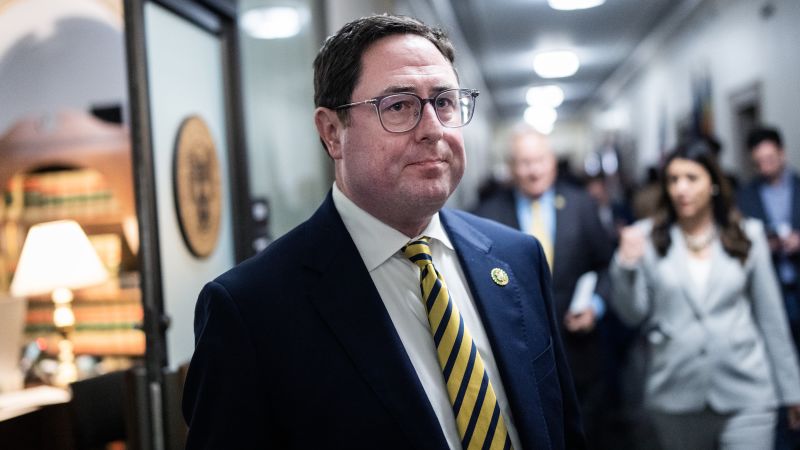On a recent evening in Lincoln, Nebraska, Republican Representative Mike Flood found himself at the center of a heated town hall meeting that showcased the growing friction between constituents and elected officials concerning current policy issues. The congressman was consequently met with widespread criticism from attendees, who were vocal about their dissatisfaction regarding his support for several of President Donald Trump’s policies, particularly the expansive immigration plan that Flood once dubbed “big, beautiful.” The sentiment resonated strongly throughout the meeting, with many constituents questioning the underlying implications of such policies which they argued posed significant threats to democratic processes.
The atmosphere, charged with urgency and frustration, erupted early on as crowds broke into chants of “tax the rich” during Flood’s defense of his votes tied to the President’s legislative agenda. Located at the University of Nebraska, it served as the backdrop for an intense dialogue where Flood was seeking to convey his belief that the proposed legislation would foster economic growth and provide necessary support for different sectors, especially agriculture, while also protecting vulnerable communities. “I support this bill because I believe it protects Medicaid for the future,” he asserted against the din of dissatisfaction from the gathering, further reaffirming his stance despite the visible discontent in the room.
As one of the few Republican congressmen opting to conduct in-person town halls during the congressional recess, Flood was purportedly attempting to rally support for Trump’s recently signed legislation, following directives from the National Republican Congressional Committee (NRCC). The NRCC urged representatives to utilize this period to advocate for the party’s platform and mitigate criticisms stemming from the administration’s perceived flaws. Surprisingly, Flood’s effort received vigorous pushback, with constituents probing into various pressing issues including not only immigration but also tax reforms, healthcare access, and the war in Gaza. The conflicting energies led to an extended exchange of grievances during the question-and-answer segment marked by chants, booing, and interruptions.
In a particularly tense moment, an audience member challenged Flood regarding government spending amid concerns over what was termed “fascism” and the staggering operational costs of a controversial immigration detention center in Florida referred to informally as “Alligator Alcatraz.” The question that ensued, regarding the fiscal implications of maintaining such facilities, drew applause and underscored a deep-seated concern among constituents about governance and accountability. Flood defended his decisions by emphasizing the outcomes of the prior election, framing the choice as one between lax border policies and stringent enforcement mechanisms, reinforcing his belief that Americans had voted to bolster border security.
As frustrations mounted, another member of the audience voiced disdain for the congressman’s perceived alignment with policies they attributed to a “fascist machine,” referencing Project 2025, a blueprint centered around conservative principles. Flood refuted the claims, stating his engagement with constituents represented democratic value, although the crowd remained skeptical, continuing to voice dissatisfaction.
In addition to immigration issues, the budget bill that had recently passed, which one attendee dubbed “the big ugly bill,” also attracted intense scrutiny, especially with regard to its implications for veterans and healthcare services. Veterans present expressed their fears about potential threats to their benefits, challenging Flood as to how he could support a law seen as antagonistic to veterans’ needs. Flood attempted to alleviate concerns by mentioning ongoing discussions with the Secretary of Veterans Affairs but failed to provide specific recommendations, leaving many constituents unconvinced.
In a noteworthy divergence, Flood also addressed growing public curiosity about the Jeffrey Epstein case—a subject that has dominated discussions in Washington recently. When asked about the alleged cover-up related to Epstein’s files, he promised to support efforts for transparency, vowing to be an advocate for releasing necessary records while ensuring the victims’ dignity remained protected.
Meanwhile, on the opposing side of the political spectrum, in Benton Harbor, Michigan, Democratic Senator Elissa Slotkin articulated her views on presidential powers amid the same emotional environment concerning government reforms and pardons. Engaging with constituents, she raised concerns over the ethical implications of pardon powers demonstrated during her discussions. Slotkin signified reservations about the normalization of such power, asserting healing for the wrongfully imprisoned should be prioritized rather than utilizing the power as a bargaining chip in political machinations.
As the political landscape faces challenges following a turbulent summer recess, constituents across party lines remain visibly engaged with their elected officials, exemplifying the ever-pressing need for accountability and responsiveness in governance. These recent town halls serve to highlight the rich tapestry of American democracy, where vigorous policy debate remains paramount in shaping the future direction of the nation.











